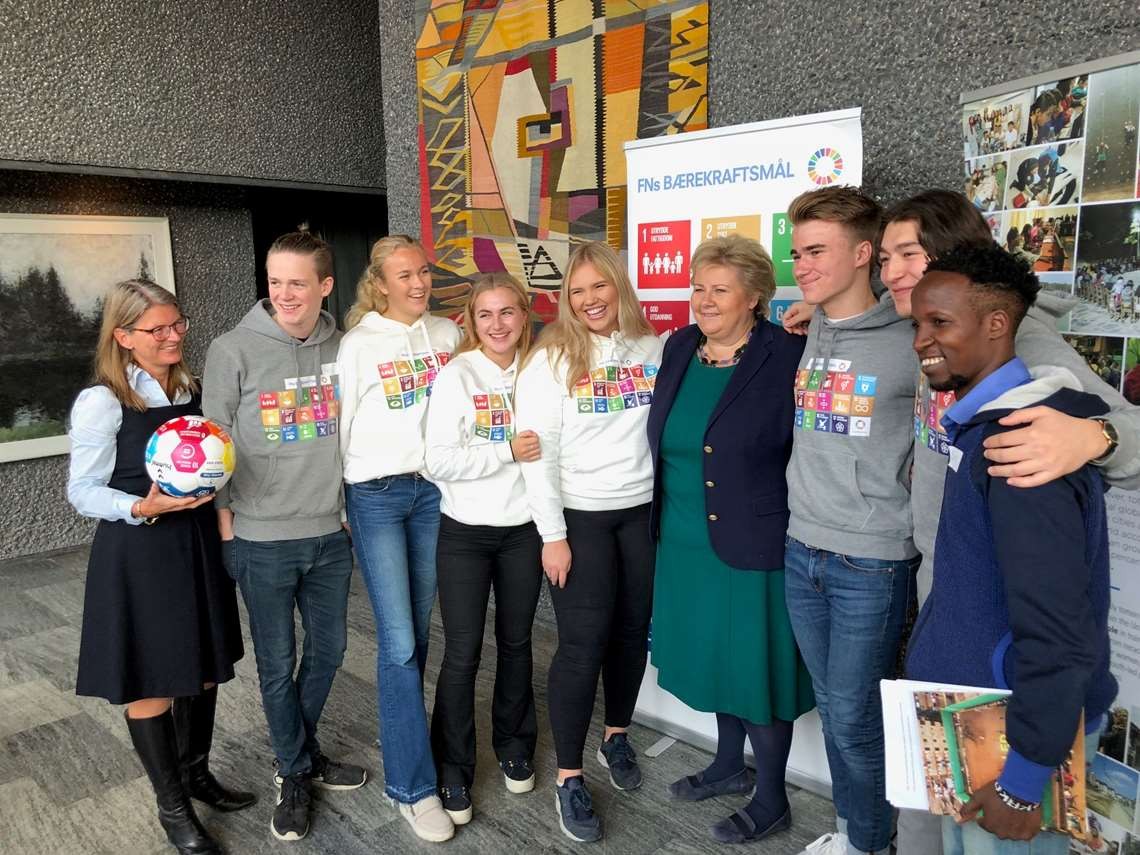
Norway’s Prime Minister, Erna Solberg (in the middle), and Lene Conradi, mayor of Asker municipality (to the left, holding the SDG ball), were both popular among the youth at the Asker Conference. Credit: Ragnhild Sofie Rygg / Asker municipality
The 2030 Agenda has been globally acclaimed but implementing the all-embracing ambitions into local contexts can be a demanding exercise. That is why UNDP is currently supporting the implementation of the SDGs at sub-national level in around 47 countries, facilitating innovative partnerships and sharing of practices, innovation and knowledge.
Three municipalities in the metropolitan area of Norway’s capital are showing the way: by bringing in the youth, localising the SDGs – and seizing them as a united motivation and framework for their merging municipalities. “The Sustainable Development Goals will help guide our work and priorities – and to develop good solutions for the future – solutions that also will contribute globally” said Lene Conradi, mayor of Asker municipality, in her inaugural speech at the Asker Conference 2018.
The conference was organised on UN Day, in partnership with UN-Habitat, and attended by three Norwegian ministers, including PM Erna Solberg. Youth from local upper-secondary schools were invited to provide input on selected SDGs and present their solutions to the Prime Minister. “Youthless governance is useless governance” the Asker mayor declared: “If we are building a municipality for the future – then we need input and advice from our future citizens.”
This new municipality will take shape in 2020, when Asker, Røyken and Hurum – three municipalities in the Oslo metropolitan region – will merge into a new and larger one, referred to as New Asker to separate it from the current municipality. When designing the framework of New Asker, the mayors of the merging municipalities made a common decision: The making of New Asker will be based on the Sustainable Development Goals, linking local and global governance. The Global Goals create enthusiasm and cooperation across political lines, New Asker Municipality reports, and they add to a shared identity for the new municipality. A merger of municipalities can be a challenging experience of conflicting interests and political horse-trading. Or, as in New Asker’s case, an opportunity to unite in a common ambition – and bring in the youth.
New Asker’s energetic and progressive approach is in the forefront of SDG localisation but luckily not unique. The effort of implementing the 2030 Agenda at the local level is a global phenomenon, and UNDP is profoundly and enthusiastically facilitating.
For example, In Ecuador, we are working with state and local authorities to integrate the SDGs into national and subnational plans and ensure the monitoring and review of SDG implementation. In Brazil, UNDP partners with the National Confederation of Municipalities to raise awareness, integrate the SDGs into local plans and to build up monitoring and accountability systems at the local level. We also facilitate knowledge exchange with other local governments and associations in Latin America and the Caribbean.
In Morocco, UNDP has supported local governments in setting up Maisons de développement, focused on promoting exchanges and partnerships between all development actors. They have become the entry point for development partners into the regions, providing them with a physical coordination space and a platform to harmonise and coordinate development efforts.
In South Korea, we have signed a partnership with the Seoul Metropolitan Government to promote innovation for new municipal services. In China and India, municipalities are training local officials on SDGs using an online training module developed by UNDP. In Timor-Leste and Pakistan, we are supporting municipalities and districts to integrate SDGs in local plans and budgets. Other examples extend to Myanmar, Mongolia, Malaysia, the Philippines, Vietnam, etc.
To achieve the 2030 Agenda, local authorities and municipalities need to share practices, innovations and solutions. Decentralized cooperation is a tested and crucial mechanism to do it. UNDP is deeply committed to facilitate and accelerate these partnerships worldwide.
More info:
New Asker municipal report: The new Asker municipality is based on the UN Sustainable Development Goals
Nordregio report: Global goals for local priorities: The 2030 Agenda at local level
Written by Amy Gill, Local Governance Specialist, Responsive and Accountable Institutions Team, UNDP and Endre Stangeby, Communications Consultant, UNDP Oslo Governance Centre.
The article was originally published on UNDP website: https://bit.ly/2QmyQp6

Comments